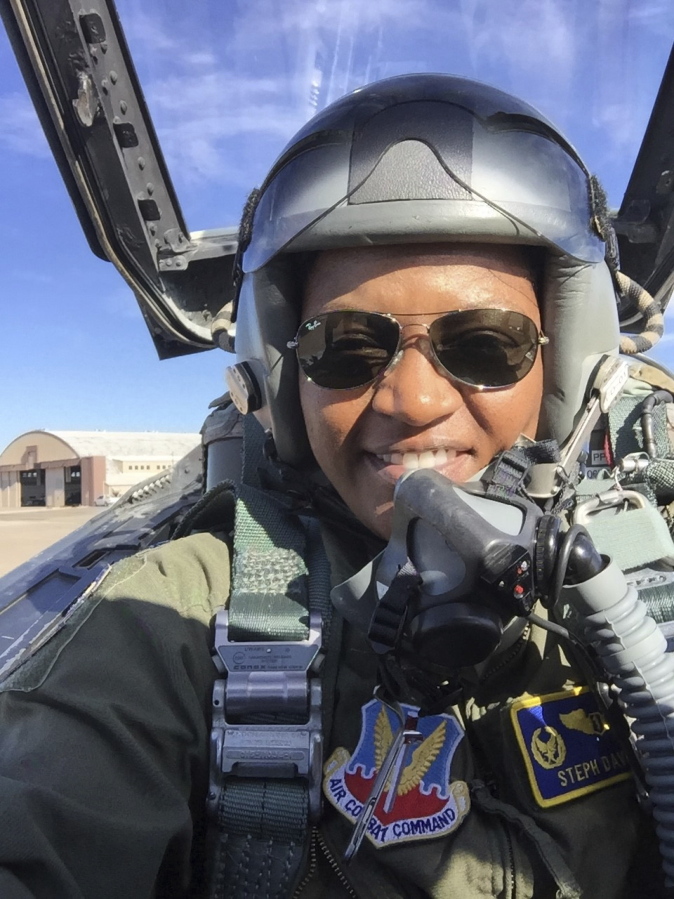For Stephanie Davis, who grew up with little, the military was a path to the American dream, a realm where everyone would receive equal treatment.
She joined the Air Force in 1988 and steadily advanced over the course of decades, becoming a flight surgeon, a commander of flight medicine at Fairchild Air Force Base and, eventually, a lieutenant colonel.
But many of her service colleagues, Davis says, viewed her only as a Black woman. White residents gave her the call sign of ABW — it was a joke, they insisted — for “angry black woman,” a classic racist trope.
White subordinates often refused to salute her, and she was attacked with racial slurs, she said.
“For Blacks and minorities, when we initially experience racism or discrimination in the military, we feel blindsided,” Davis said. “We’re taught to believe that it’s the one place where everybody has a level playing field and that we can make it to the top with work that’s based on merit.”
In interviews with The Associated Press, current and former enlistees and officers in nearly every branch of the armed services described a deep-rooted culture of racism and discrimination that stubbornly festers, despite repeated efforts to eradicate it.
The AP found that the military’s judicial system has no explicit category for hate crimes, making it difficult to quantify crimes motivated by prejudice.
The Defense Department also has no way to track the number of troops ousted for extremist views, despite its repeated pledges to root them out. More than 20 people linked to the Jan. 6 siege of the U.S. Capitol were found to have military ties.
The AP also found that the Uniform Code of Military Justice does not adequately address discriminatory incidents and that rank-and-file people of color commonly face courts-martial panels made up of all-white service members.
And racial discrimination doesn’t exist just within the military rank-and-file. Every year, civilians working in the financial, technical and support sectors of the Army, Air Force and Navy file hundreds of complaints alleging race and skin-color discrimination, according to an AP analysis of U.S. Equal Employment Opportunity Commission data.
In February, Lloyd J. Austin III — a former Army general who now is secretary of defense, the first Black man to serve in the post — ordered commanders and supervisors to take an operational pause for one day to discuss extremism in the ranks with their service members.
The Southern Poverty Law Center sent Austin a letter shortly after his order, applauding him for his decisive action but underscoring that systemic change on all military levels is urgent.
“Those who are indoctrinated into white supremacist ideology present a significant threat to national security and the safety of our communities,” SPLC President Margaret Huang wrote.
“We know that far too many service members indicate they experience discrimination,” said Pentagon spokesman Maj. Cesar Santiago. He noted that the Defense Department had launched multiple efforts in the past year, including updating its anti-harassment policy, assessing its training on implicit bias, and developing data-driven strategies to guide efforts to attract and retain diverse members and identify unhealthy work environments.
In the midst of last year’s summer of unrest sparked by police killings of Black Americans, Army Gen. Mark A. Milley — who is also the Department of Defense’s Chairman of the Joint Chiefs of Staff — told congressional leaders the military cannot afford racism or discrimination.
“We who wear the cloth of our nation understand that cohesion is a force multiplier,” Milley said. “Divisiveness leads to defeat.”
Austin pledged to rid the ranks of “racists and extremists” during his confirmation hearing before Congress, which came on the heels of the Jan. 6 Capitol insurrection.



